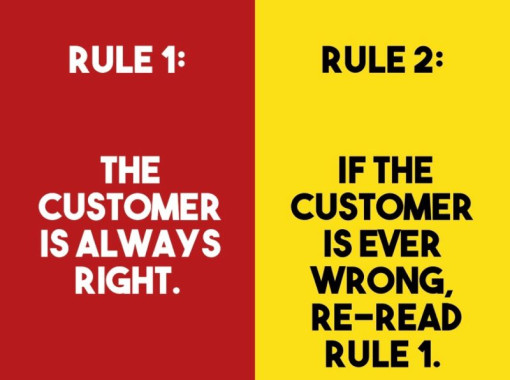When is the rule, "the customer is always right," wrong?

When is the rule, "the customer is always right," wrong?
.
.
.
As long as I can remember, we have been told:
Rule #1 The customer is ALWAYS right.
Rule #2 If the customer is ever WRONG re-read Rule #1.
While the customer is undoubtedly important and their satisfaction is and should be a top priority, there are instances where blindly following this rule, is just plain stupid.
Far too many companies live and die by those dreaded C.S.I. scores, and the problem is, customers know it.
Bonuses are based on them, raises are based on them, heck for some even their jobs themselves could be on the line.
Does this seem right to you?
What if the customer is making unreasonable or unethical demands? They threaten to give you “one star” if you don’t give them what they want. These requests or demands go far beyond what would be considered reasonable or ethical.
In times like these, businesses need to stand their ground and make decisions that align with their values and principles.
What happens when clients abuse and mistreat employees?
No one should be talked to in an abusive or disrespectful manner.
If this happens, a leader needs to step in and address the bad behavior.
What if the client expectations just can’t be met? Face it, there are times when what the client “expects” is unrealistic for a variety of reasons. There might be budget constraints, technology limitations, or other factors beyond a business's control.
When leadership communicates openly with customers about these limitations, they can then focus on finding alternative solutions that can help manage the expectations more effectively.
What happens if “what you do for one” negatively impacts another? While we strive to satisfy our customers, we need to think about the impact their demands may have on other customers. Balancing the needs and expectations of all customers is key to maintaining a harmonious and fair environment.
What if the monetary effect of their demands are detrimental to the financials? Leaders have to evaluate the long-term profitability of “satisfaction decisions.” Sometimes, accommodating every request could lead to unsustainable costs. Leadership should budget for “client issues” and do everything to stay within the budget.
While the customer's happiness and satisfaction are important, the rule "the customer is always right" should be challenged in certain circumstances.
Remember that building strong, lasting relationships with customers is about finding a win-win situation where both parties benefit.
Go and make a difference in someone’s life today!
- - - -- -
#business #generosity #higherauthority
- - - -- -
🔔🔔 Follow Me for common sense advice on #AuthenticLeadership and life.🔔🔔
